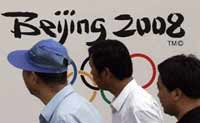USA uses Summer Olympics 2008 to label China as new empire of evil
Appeals to boycott Olympic Games in Beijing and scandals connected with attempts to disrupt the traveling of the Olympic flame across continents have become the best advertising of the Summer Olympics 2008. As a result, even those who have very little interest in sport and politics, are aware of the time and place of the Olympic Games.

As for the reasons of boycott appeals, they have alternative versions. The progressive part of the human race persistently emphasizes humanitarian values, which the communist leadership of China tries to suppress. Others dwell upon the new cold war and the pressure, which is being put on China against the background of its speedy development.
Until recently, the subject of human rights in China and the fate of Tibet did not raise any interest in the world. However, these two topics have found themselves in the center of global attention.
Human rights activists and the Dalai Lama followers regularly hold conferences on Tibet. Amnesty International has always criticized the Chinese administration for persecution of dissenters, suppression of freedom of speech and other violations of human rights. All of that was not a secret in 2001, when the decision was made to hold the Summer Olympics 2008 in Beijing. Appeals to boycott Olympic Games in China are not new either, although no one discussed them seriously before.
The subject of boycott was officially recognized in august of 2007, when the US Congress received two resolutions to boycott the Summer Olympics in China. One of them was addressed to the government and the other one – to the President of the United States. The two resolutions interpreted boycott as sanctions against China and its administration, which violates human rights and supports criminal regimes in Sudan, Burma and North Korea. Tibet was also mentioned in the text of resolutions, but the authors paid their prime attention to Sudan. They asked the Chinese administration to publicly acknowledge and condemn atrocities in Darfur, to cease any arms shipments to the government of Sudan and suspend all kinds of economic cooperation with the government of Sudan.
Experts said back then that such a strong emphasis on the problem of Sudan was a reflection of US concerns over economic, political, and ideological policies, which China was running on the African continent. It goes without saying that these problems are based on serious geopolitical interests which have nothing in common with the struggle for human rights. The subject was touched upon again in February of the current year, when Steven Spielberg stated that he was not going to be the artistic adviser for the opening and closing ceremonies of the Games when China was contributing to monstrous crimes against mankind in Sudan’s Darfur.
Recent events, which took place in Tibet in March, infused a fresh spirit into the campaign to boycott Olympic Games and mobilized the Tibetans, Buddhists and supporters of democracy and freedom all over the world. However, the anti-Chinese campaign has not turned into a large-scale phenomenon, because it is the USA and Britain, which young rebels of the whole world associate with evil. The modern world sees the USA as the major source of global threats.
It goes without saying that the US administration is doing its best to hang the label of “the new empire of evil” on a foreign country. Putin’s Russia was probably one of the first candidates on the list taking into consideration the recent US-Russian opposition on major international issues. However, Russia has not committed something that could be referred to as the most vicious act of evil-making, which the US administration could use to declare Russia the prime enemy of democracy and progress in the world.
On the other hand, the controversial campaign with the Olympic Games in China does not touch upon economic and all other forms of US-Chinese relations.
Photo by: 2008.sina.com.cn
Utro
Translated by Dmitry Sudakov
Pravda.ru
Subscribe to Pravda.Ru Telegram channel, Facebook, RSS!




